You can trust Cyclingnews












This article first appeared on Bikeradar
The S-Works Tarmac Women’s is sleek, smooth and serious: seriously good-looking, seriously fast, seriously amazing to ride — and as this is the S-Works version, seriously expensive.
Aesthetically, this bike is a head turner. In my opinion, it’s the best-looking bike from the entire Bike of the Year test fleet.
The clean lines of the almost architectural frame aren’t blurred by unnecessary elements — cables are routed internally, the seatpost is clamped internally, brake calipers are tucked neatly behind the seatstays.
Everything from the matt-black frame with contrasting colourful decals on the down tube and seatstays towards the rear hub, to the plain-black bar tape and the tan sidewall tubeless tyres, shout about the pedigree of this bike.
Replacing the Amira
Up until this point, the women’s specific race bike in the Specialized road lineup was the Amira — an extensive product line that covered everything from entry-level road bikes to those ridden by the Boels Dolmans team and the former Specialized Lululemon team.
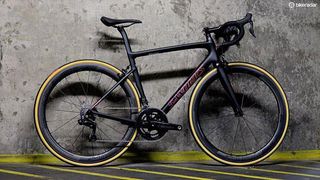
But over the past couple of years Specialized has shifted its approach when it comes to women’s specific design. Specialized counts Retul, a bike-fit system, as part of its portfolio. This means it has access to thousands of body measurements, sorted by gender as well as riding discipline and preferences.
Based on this, Specialized has determined that rather than needing distinct frame geometries, men and women will have the best fit and experience on a unisex frame that takes data from both into account, with sex-specific contact points.
The new Tarmac replaces the Amira at Expert and S-Works level, but you can still get the Amira at the levels below this. 2018 is a transitional year for the Amira SL4 at Sport and Comp levels though, so expect to see changes here for 2019.
The men’s and women’s S-Works Tarmacs are like-for-like for the most part — same price, same spec and mostly same finishing kit.
The saddle on the women’s is the Oura Pro, a saddle designed to support an aggressive race position, with carbon rails and base. The S-Works SL Carbon handlebars have a shallow drop and narrower width than on the men’s bikes, with the 54cm bike tested here coming with 400mm bars, and the men’s equivalent 54cm coming with 420s.
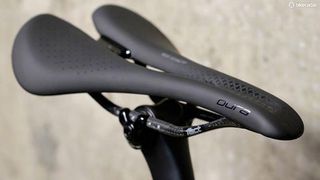
Crank sizes also vary between sizes and between the men’s and women’s spec. Most of the women’s tarmac models come with smaller cranks, with the 54cm frame coming with 170mm rather than 172.5mm cranks, the 49cm coming with 167.5mm cranks rather than 170mm cranks, and so on.
Interestingly, some sizes come with the same crank size. Both the men’s and women’s 52cm frame are fitted with 170mm cranks, and if cranks lengths are related to rider height, as the frame size is, why offer different sizes on the women’s Tarmac models?
It’s a question I put to Specialized. “The answer is not that exciting,” shares Will Watt of Specialized UK, who liaised with Todd Carver of Retul to provide an answer. “All the OE specs on our performance road platforms are determined by our experience from and database of rider fits from Retul. These crank-length choices, size for size, men and women, are consistent with that data.
“However, strictly, there is not a specific biomechanical reason for women to use shorter cranks than men at the same size,” he continues. “Most brands have historically specified a shorter crank on women’s bikes, and most riders who go through a fit, regardless of the fit service, come in with a crank length and are fitted to it.
“Very few riders choose to make a crank-length change as part of the fit unless they have good reason. Injury is number one, and curiosity is number two. Curiosity is usually negated by the cost of a new crank.
“So, there is an argument that ultimately OE spec has driven fit that has, in turn, sustained an expectation or standard. For us, we have to be lead by Retul Fit data, and our crank length choices come from this.”
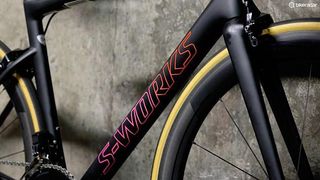
Specialized Women's S-Works Tarmac SL6 frame
Constructed from Specialized’s top-of-the-line FACT 12r carbon, each frame is made from a size-specific layup that’s designed to ensure both a consistent performance across the sizes and also the optimal weight-to-strength ratio.
This contributes to a large degree to the ridiculously light weight of this bike. At 6.34kg it’s the lightest bike in the test, though you’d expect this given the premium price tag (it’s also the most expensive). The second lightest bike is the Ultimate WMN CF SLX Disc 8.0 Team CSR at 7.38kg (and just over a third of the price) and the heaviest is the Liv Avail Advanced 1 at 8.95kg, also the second cheapest bike on test for Bike of the Year 2018.
The best way to describe the feel of the frame is ‘tuned’. It’s a pure feeling that encapsulates a direct feeling of speed, contact with and feedback from the ground without fatiguing chatter.
The tubeless Turbo Cotton tyres are more than just a stylish addition with their tan sidewalls — the grip offered is outstanding. They offer an unsurpassed level of grip, giving additional security which, when combined with speed and the tuned, balanced feeling of the bike, gives you confidence that cornering hard will result in success rather than road-rash.
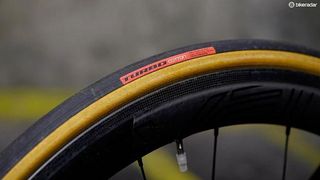
The premium wheel construction, with stiff carbon rims and CeramicSpeed bearings, carries momentum supremely efficiently. The 50mm rims have, according to Specialized, been wind-tunnel tested to ensure they are as aerodynamic as possible.
The choice of Shimano Dura-Ace Di2 is an unsurprising choice for a pro-level race bike. It offers quick smooth changes with only slight pressure on the shifters and a satisfactorily high-tech whirring noise.
The Tarmac has 52/36t chainrings with an 11-30t cassette, and this gear range means powerful legs will be able to put out megawatts and serious speed in the sprints, but will also allow respite on climbs both punchy and drawn out especially complemented by the low overall weight of the bike.
Handling is beautifully responsive and precise. It’s agile enough to dance around obstacles but doesn’t feel twitchy. Controlled, nimble and balanced are the watchwords.
Specialized Women's S-Works Tarmac SL6 overall
The Tarmac is my choice for best race-focused road bike for 2018.
It’s the pinnacle of racing perfection. It has incredible acceleration, agile handling without twitchiness, superb confidence on corners, aero features, efficient power transfer — the works.
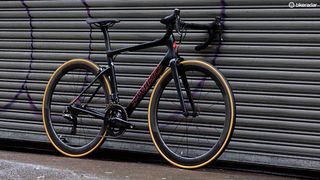
It’s light and it’s fast, and while that lightness contributes to the speed it’s not the only factor. The inherent stiffness is direct — put down a pedal stroke and you’re flying forward almost before you realise, like three-dimensional carbon EPO, with the upside that it’s entirely UCI-legal.
Don’t just take my word for it though, fellow Bike of the Year tester Anna Cipullo also fell in love with S-Works Tarmac. “The handling is second-to-none,” she comments. “I love how easy it is to flick around corners and descend curvy roads without a hint of uncertainty. It’s stiff, but by no means harsh. If you’ve got the money for it, I doubt you’d be wanting for more in any road-riding situation.”
By its very nature, this is a bike that anyone with a serious desire for speed, control and performance will go for.
While the S-Works model represents the pinnacle of the range, there is also the lower priced Tarmac Expert, which gives you the same geometry but in slightly lower priced FACT 10r carbon. It’s built with a Shimano Dura-Ace groupset, alloy handlebars and stem and good-quality Roval CLX wheels.
Specialized Tarmac Women’s price, sizes and availability
This version of the Tarmac comes in at £8,500 / $9,500 / AU$13,000, but you can get the lower priced Tarmac Women SL6 Expert for £3,500 / $4,000 / AU$5,000.
The Specialized Tarmac Women’s is available in sizes 44, 49, 52 and 54.
Since the frame is unisex, this means riders who take a 56 or above can opt for the men’s bike (although this will have male-focused contact points that may need swapping out depending on personal preference).